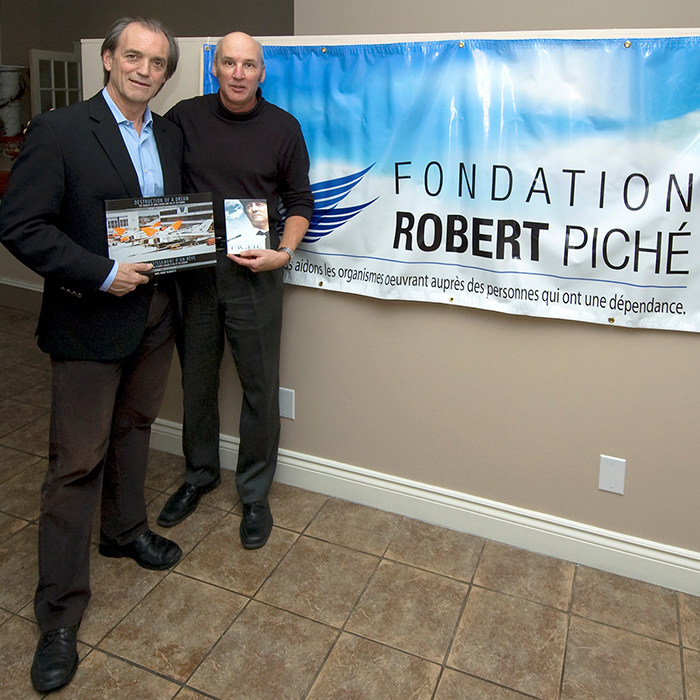
Pilot Robert Piche, left, will speak at the St. Clair College Capitol Theatre July 22, detailing how he managed to land a passenger jet that ran out of fuel over the Atlantic Ocean.
When pilot Robert Piche found himself holding the lives of more than 300 passengers and crew in his hands over the north Atlantic Ocean, little did he know that a training program from Chatham was going to help him save everyone on board.
Piche’s Air Transat Flight 236 bound for Portugal, from Toronto on Aug. 24 2001 suffered a complete power loss some four hours into the flight, forcing him to attempt what would become one of the most harrowing “dead-stick” landings in history.
For the next 19 minutes, Piche flew the plane as a glider through a variety of maneuverers to reduce speed and altitude before finding a landing strip in the Azores.
The glider training he used was first developed in the 1960s by Chatham by Air Cadet Wing 294.
Bruce Davidson, chair of the sponsoring committee that is bringing Piche to Chatham to speak at this year’s Flight Fest July 22, took the Chatham training when he was a cadet in the 1960s.
The program was showcased in Trenton in 1968 and so impressed national defence officials that it was rolled out across the country and is part of standard training now.
“They liked what we did,” he said. “They weren’t quite as impressed with the winch method we used to get gliders into the air so when they adopted the program and started offering it around the country, they used tow planes.”
Piche, who is still a commercial pilot with Air Transat, spoke with The Voice recently after an overnight flight from Paris.
“When you’re a pilot in mid ocean, it’s the worst kind of kind of thing that can happen,” he said. “Never in your dreams do you think of this. We had a warning there was serious fuel shortage. We were at 39,000 feet when we found out. One engine died and the second one did also a few minutes later.”
He said ditching into the ocean was the most obvious outcome, but one he didn’t want to consider.
“It was dark, there was a 28-knot wind and the prospects weren’t good,” he said. “Even those who survived the crash would have to deal with a lot of sharks in those waters.”
Air Traffic Control directed him to the Azores, but trying to manoeuvre a 150-ton plane without power was another matter.
“We instructed the passengers to put on life vests because what we were trying to do, is not what the plane is designed to do. It crossed my mind that we could all die.”
Piche, who was 48 and had more than 16,000 hours in the air, began his descent at 2,000 feet per minute.
The plane landed hard at the Lajes Air Base at what Piche estimated was 300 miles per hour.
“We jumped 30 feet in the air when we hit and went 2,000 meters before we hit again,” he said. “We blew out almost all of the tires.”
A few passengers suffered minor injuries from the landing.
“I would have preferred a slower landing, but we had only one chance,” he said.
An investigation of the incident found “there was not a clear, unambiguous indication or warning that a critical fuel leak existed.
“We didn’t believe the first warning because all it told us was that there was an imbalance in fuel so we shifted,” Piche said. “The report found there was a leak of one gallon per second in a fractured line,” he said.
Piche said he still keeps in touch with some of the passengers and he knows of some who have had post-traumatic stress because of it.
“I still love flying,” he said. “I sometimes fly with members from the flight crew that day and we give each other a look and maybe a fist bump,”
Piche will tell his entire story at the Capitol Theatre July 22 at 7 p.m. Tickets are $20 and can be purchased through http://www.cktickets.com
or by calling the box office at 519-354-8338.





